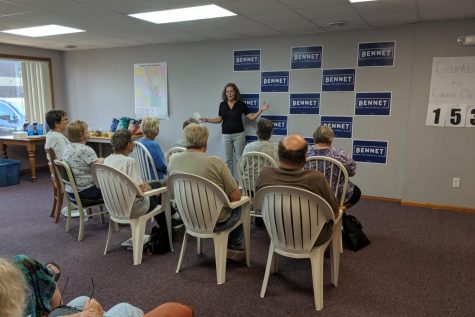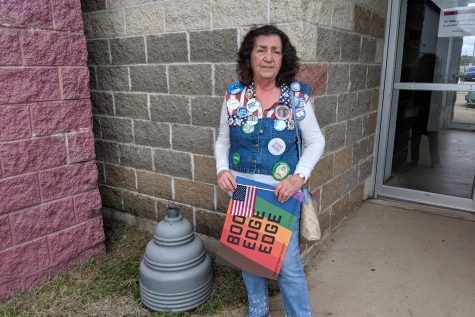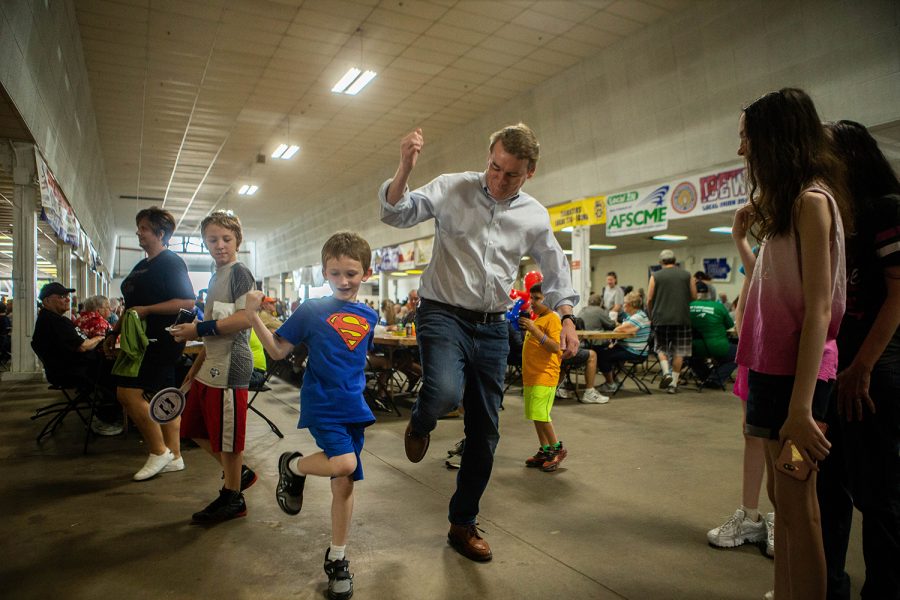152 days until the Iowa Caucuses, Michael Bennet and Steve Bullock hope for break out moment
With 20 presidential hopefuls competing for the Democratic nomination, support is spread thin in Iowa. For some lower-polling candidates, the race still looks wide open.
Liam Bogs (7) of Cedar Rapids teaches Sen. Michael Bennet, D-CO, during the Hawkeye Area Labor Council Picnic at Hawkeye Downs on Monday, September 2, 2019.
September 3, 2019
About five months out from the Iowa caucuses, Susan Daggett — wife to U.S. Senator from Colorado Michael Bennet — clutched a couple pages of notebook paper in her hand and launched into her husband’s presidential pitch to a group of about 15 people in an office on the eastern side of Iowa City.
She was presiding over the opening of her husband’s second Iowa campaign office in Iowa City on Tuesday, which marks an expansion of Bennet’s Iowa campaign despite Bennet remaining near the bottom of the pack in polling and donations.
“We are playing catch-up,” Daggett told the group of mostly undecided caucus-goers, referencing Bennet’s bout with cancer delaying his entry into the race. “But he is a guy who deeply, deeply believes that we’ve seen troubles in the past… and we can, as Americans, come together.”
After a Labor Day weekend swing in Iowa, two Democrats hugging the bottom of the polls are emphasizing that five months is enough time to build a following in the first-in-the-nation caucus state.
“My whole plan is to be there every step of the way,” Montana Gov. Steve Bullock said after completing 12 events across Iowa where he focused on counties that swung from Obama to Trump in 2016.
Bullock and Bennet’s holiday weekend swings also came after the Aug. 28 deadline to qualify for the September debates, which half of the 20-candidate field qualified for.

Both Bullock and Bennet told The Daily Iowan in interviews they’re focusing on campaigning person-to-person in Iowa and New Hampshire rather than grasping for poll numbers and donations to qualify for the debates. Both are polling between 0 and 2 percent in national polls according to RealClearPolitics.
Although both candidates are aiming to qualify to be on the October debate stage, the televised debates aren’t essential to their runs for president, the pair said.
The time period between Labor Day and October marks the time when campaigns either sink or swim, Linn County Democratic Chair Bret Nilles said.
“Usually this is the point where the campaigns really need to kick off in terms of how much alignment they can get and how much energy they can create on their own,” Nilles said.
Nilles, who attended a Bennet town hall in the upstairs of Raygun in Cedar Rapids, said while debates help garner name recognition and exposure, he didn’t think a debate appearance was an incredibly important metric for Iowans attending political events such as Bennet’s.
The Democratic National Committee sets requirements for presidential contenders to make the third and fourth debates — at least 2 percent in four DNC-approved polls and contributions from 130,000 unique donors.
As the deadline for the September debates approached, four candidates for the nomination announced they would be dropping their bid as it became apparent they wouldn’t make the stage, including Kirsten Gillibrand, John Hickenlooper, Jay Inslee, and Seth Moulton.
RELATED: On Labor Day in Iowa, 2020 Democrats pledge support for unions
Neither Bennet nor Bullock say they have plans to drop out, saying it’s still early in the nomination process.
“People in Iowa, South Carolina, and Nevada, I don’t think they’ve made up their minds, and I think this race is wide open,” Bennet told reporters in Cedar Rapids.
Around this time in 2016, where there was a wide primary field on the Republican side, the first contender to exit the race did so in September 2015, about five months before the Iowa caucuses, but most dropped out in February.
In order to meet the DNC metrics, which are the same to qualify for the October debates, some candidates without strong name recognition or a widespread grassroots base must spend more money on ad buys to garner more unique donors online.

Bennet’s largest purchases have been on digital ad buys, spending collectively over $700,000 of his $1.3 million in expenditures between early May and mid-June.
Bennet raised $3.5 million from April 1 to June 30, ranking 17th among the candidates. About 60 percent of his funding is from individual donations of over $200, according to data compiled by OpenSecrets.org. Bullock has raised $2 million, though his biggest expense is payroll (Bullock has two dozen staff members in Iowa).
Bullock is focusing his campaign heavily on his identity as a Democratic governor who’s won handily in a Trump state. Over Labor Day weekend, Bullock focused on counties that swung from Obama to Trump in 2016, starting in Winneshiek and Mitchell Counties, who respectively flipped from Obama to Trump by 16 percent and 27 percent in 2016.
Bullock, who is a former Attorney General of Montana has picked up endorsements from Iowa Attorney General Tom Miller and former state Rep. Bruce Bearinger.
At the office opening in Iowa City, Chuck Bigelow of North Liberty, called Bennet a “dark horse” candidate because he wasn’t well known. But, either way, he said he wanted to hear out each candidate’s platforms, no matter how well they are doing nationally.
“I want to meet him, I want to talk to him, I don’t want to just listen to the radio or read the newspaper. I want to hear what the campaign is about,” Bigelow said.



